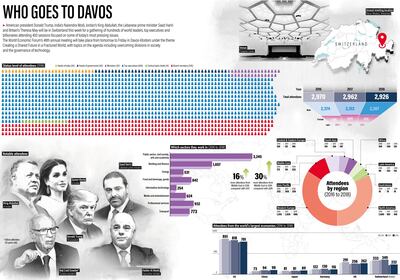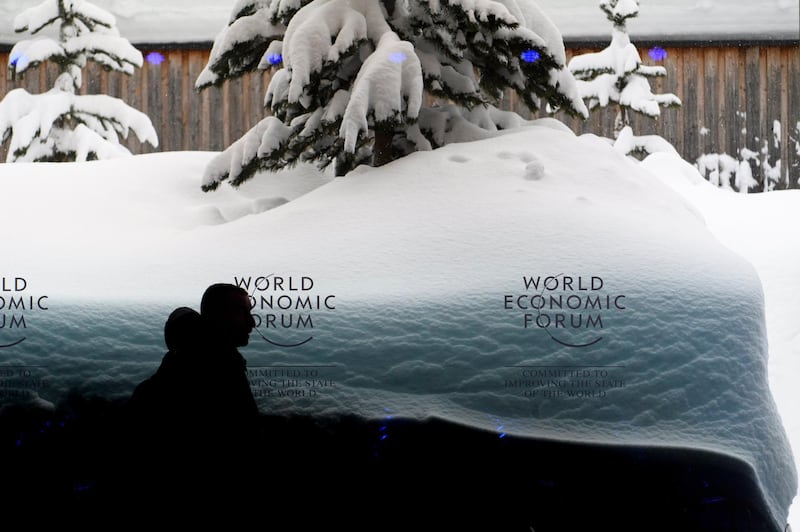It is that time of year again. More than 2,500 participants, hundreds of whom come with support staff, assistants and in some cases, their own security guards, are arriving at the alpine village of Davos, home to the world’s elite for one week every January.
This year they come together at the annual meeting of the World Economic Forum (WEF) under a stark headline: Creating a Shared Future in a Fractured World. Seeking the creation of a "shared future" is not new to WEF; rather, it is one of its core tenets as an international organisation mandated by the Swiss government.
Yet the acknowledgement of the dire state of a "fractured world" is an important one. The stated fracturing is not only in world relations but increasingly, within societies. The rise of populism and protectionism is of concern to those who have relied on closer international cooperation to prosper.

Those who have championed stronger international cooperation, like German chancellor Angela Merkel, are facing problems at home while those pushing a more confrontational approach appear to be in a stronger position. They will be present at Davos this year in force. In a nod to the populist tide impacting politics across the world, Indian prime minister Narendra Modi and American president Donald Trump will give two keynote speeches at the start and end of the meeting respectively.
Last year’s annual meeting was overshadowed by the election of the US president. Chinese president Xi Jinping’s speech in 2017 was clearly critical of the world view Mr Trump presented, stating: ‘When encountering difficulty, we should not complain, blame others, or run away from responsibilities...Instead we should join hands and rise to the challenge. History is made by the brave.”
Brave leadership in a modern era, where fake news spreading like wildfire on social media has enabled character assassination, is not easy to come by. Meanwhile, as corporate leaders seek to please shareholders with commercial gain and political leaders pursue short-term policies to appease constituents, trust in leadership in the modern era raises doubts as to how this fractured world can heal.
While Mr Xi will not be attending this year's meeting, his words will be in the minds of many as Mr Trump delivers his speech. Last year many of those attending Davos left the closing ceremony to watch the presidential inauguration. This year they will get to hear him speaking live at the closing session. While no major U-turn is expected from the American president, his presence in Davos is a chance for him and his administration to engage with a host of international organisations, NGOs and entities seeking clarity on the future of the US.
One challenge that has come up time and time again at the meeting, especially since the financial crisis a decade ago, is that of trust. According to Edelman's trust barometer, three-quarters of populations in 28 countries recently surveyed are "distrustful" of government, business, media and NGOs – the very constituents of Davos.
As trust levels in politicians, media and international figures continue to decline and populism rises, Davos has become an easy target for criticism. Attendance is by invitation only, most sessions are closed to the press and little tangible results can be immediately seen coming out of the annual meeting.
Instead, it is seen as a place for those in power to meet and solidify their interests. As reporters from all over the world cover stories of celebrities rubbing shoulders with ministers and parties hosting Mick Jagger and dishing out caviar, the meeting has not been able to shake off mistrust about its purpose. And WEF realises it.
In including more voices from different industries and countries, and addressing these concerns, the organisation is more open today than ever before. Sessions intended to address schisms in society and rebuild trust have been built into the programme.
A total of 130 sessions will be broadcast live for all to see the discussions taking place while an open forum on the sidelines of the meeting allows anyone to come in and take part in the discussions. Moreover, this year the issue of gender inequalities has taken centre stage, with the entire meeting co-chaired by seven successful women considered leaders in their fields. Women make up 21 per cent of participants at the gathering – a low figure and yet, the highest percentage of any given year in the history of the meeting.
Much remains to be resolved and vested interests are a reflection of our modern world. Yet WEF’s continued ability to attract world leaders from various fields is testament to its convening power. As for building trust and enhancing leadership, that remains primarily a challenge for those who must practise at home what they preach at Davos.





